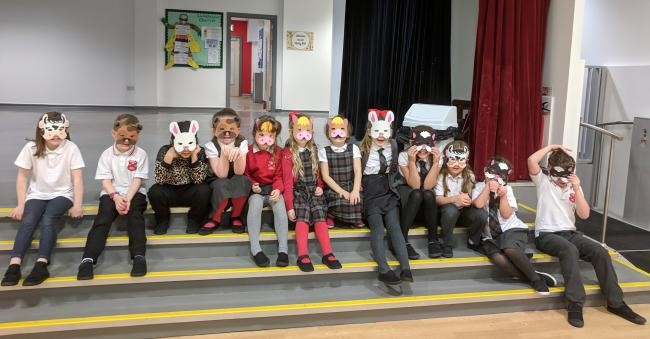Author: Christina Gemmill, Inverclyde
The multilingual realities of pupils are not always recognised in the school context and “All the world is our stage” sought to combat this by raising awareness about multilingualism through the performing arts. To that end, translanguaging – understood as the “ability of multilingual speakers to shuttle between languages, treating the diverse languages that form their repertoire as an integrated system” (Canagarajah 2011:401) – fitted like a glove!
Winhill Primary currently offers Gaelic and French and hosts a Gaelic Medium Education (GME) unit. At the start of the project, Eneida García Villanueva, researcher and Chartered Linguist, introduced translanguaging to staff and shared the suite of classroom activities designed to support its implementation. Through these activities, pupils were empowered to use their full linguistic repertoire, and some pupils revealed for the first time that they were part of a multilingual household. Materials with teacher’s guide are available on Figshare.
Thirty-six pupils signed up for the next stage and, for the next month, worked independently as three groups composed of 12 pupils each, supported by actress-singer Rebecca Cameron and four rotating teachers. The two younger groups (ages 5–9) were to perform a song while the older group (ages 8–12) was tasked with writing and performing a play.
Pupils from lower primary put forward their ideas for songs and we all voted on them. With upper primary’s play planning, pupils took full ownership and the project developed in a natural and spontaneous manner. Parental engagement was crucial, and parents provided phonetic written versions and audio recordings of songs and lines to be performed in other languages.
Through the project, language learning and teaching were supported. Everyone worked on their French as a team since everyone is learning it, and we were lucky to have GME pupils and teachers supporting us with Gaelic transcriptions and audio recordings.
Around 300 children attended the performance in the school, together with parents, 1+2 language coordinators, pupils and teachers. The performance was rated very highly.
Following this, we performed in Glasgow where 100 pupils from three local schools, representatives from Education Scotland, the European Commission and the British Council in Scotland, primary teachers, EAL teachers, Head Teachers, several Principal Teachers from secondary schools, postgraduate researchers and academics all came to see the show. Audience feedback was excellent and the performance generated a lot of interest in the project.
We will be performing in front of MSPs at the Scottish Parliament in late 2019.
Read the full article on the Creative Multilingualism blog.
